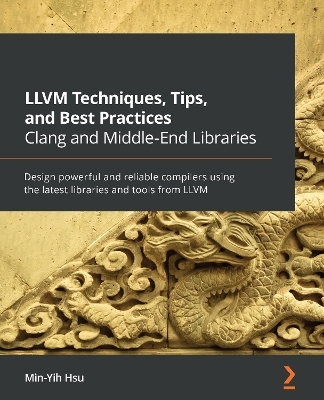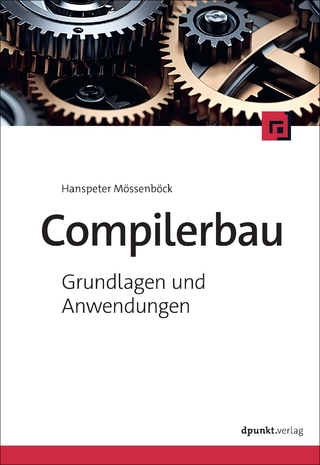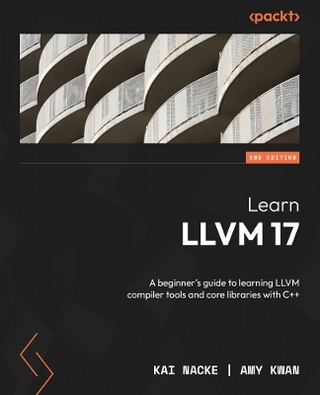
LLVM Techniques, Tips, and Best Practices Clang and Middle-End Libraries
Packt Publishing Limited (Verlag)
978-1-83882-495-2 (ISBN)
Learn how you can build the next big programming language, compiler, or source code analyzer using LLVM and Clang
Key Features
Explore Clang, LLVM’s middle-end and backend, in a pragmatic way
Develop your LLVM skillset and get to grips with a variety of common use cases
Engage with real-world LLVM development through various coding examples
Book DescriptionEvery programmer or engineer, at some point in their career, works with compilers to optimize their applications. Compilers convert a high-level programming language into low-level machine-executable code. LLVM provides the infrastructure, reusable libraries, and tools needed for developers to build their own compilers. With LLVM’s extensive set of tooling, you can effectively generate code for different backends as well as optimize them.
In this book, you’ll explore the LLVM compiler infrastructure and understand how to use it to solve different problems. You’ll start by looking at the structure and design philosophy of important components of LLVM and gradually move on to using Clang libraries to build tools that help you analyze high-level source code. As you advance, the book will show you how to process LLVM IR – a powerful way to transform and optimize the source program for various purposes. Equipped with this knowledge, you’ll be able to leverage LLVM and Clang to create a wide range of useful programming language tools, including compilers, interpreters, IDEs, and source code analyzers.
By the end of this LLVM book, you’ll have developed the skills to create powerful tools using the LLVM framework to overcome different real-world challenges.
What you will learn
Find out how LLVM’s build system works and how to reduce the building resource
Get to grips with running custom testing with LLVM’s LIT framework
Build different types of plugins and extensions for Clang
Customize Clang’s toolchain and compiler flags
Write LLVM passes for the new PassManager
Discover how to inspect and modify LLVM IR
Understand how to use LLVM’s profile-guided optimizations (PGO) framework
Create custom compiler sanitizers
Who this book is forThis book is for software engineers of all experience levels who work with LLVM. If you are an academic researcher, this book will help you learn useful LLVM skills in a short time and enable you to build your prototypes and projects quickly. Programming language enthusiasts will also find this book useful for building a new programming language with the help of LLVM.
Min-Yih "Min" Hsu is a Ph.D. candidate in computer science at the University of California, Irvine. His research focuses on compiler engineering, code optimization, advanced hardware architectures, and system security. He has been an active member of the LLVM community since 2015 and has contributed numerous patches upstream. Min also dedicates his time to advocating LLVM and compiler engineering through various avenues, such as writing blog posts and giving talks at conferences. In his spare time, Min likes to explore a variety of different coffee beans and ways of brewing.
Table of Contents
Saving resources when building LLVM from source
Exploring LLVM’s Build System Features
Advanced usages of LLVM LIT
TableGen Development: For Fun and For Profit
Exploring Clang’s Architecture
Extending the preprocessors
Handling AST
Working with Compiler Flags and Toolchains
All you need to know about the new PassManager and AnalysisManager
Processing IR in a proper way
Gearing up with support utilities
PGO and Sanitizers developments
| Erscheinungsdatum | 28.04.2021 |
|---|---|
| Verlagsort | Birmingham |
| Sprache | englisch |
| Maße | 75 x 93 mm |
| Themenwelt | Mathematik / Informatik ► Informatik ► Programmiersprachen / -werkzeuge |
| Informatik ► Theorie / Studium ► Compilerbau | |
| ISBN-10 | 1-83882-495-2 / 1838824952 |
| ISBN-13 | 978-1-83882-495-2 / 9781838824952 |
| Zustand | Neuware |
| Haben Sie eine Frage zum Produkt? |
aus dem Bereich


